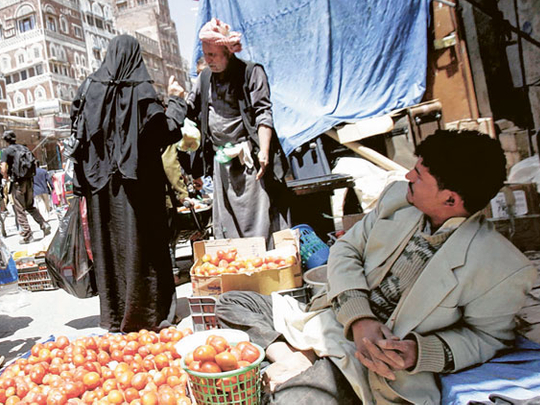
Sana'a: The small gold shop of Saeed Al Amoudi has been closed for 52 days. His shop lies in Yemen's southern port city of Mukalla which is the epicentre of both the protests that seek the Yemen president's ouster and others who call for the secession of the southern Yemen state.
"As you can see, there is no gold on display. The shop has been closed for nearly two months because of fears of looting. We are afraid that the rallies may turn violent," he said.
Unlike in other cities where the southern secessionists are out of favour, in Mukalla they enjoy great leverage and organise mass protests.
"When I want to open my shop, we are told that an anti-regime protest would pass through the street, so we board up our shop," he said.
In the morning, young people distribute papers seeking people's support for civil disobedience by closing their shops. The next evening, protesters of Herak, the southern movement, arrange a protest and always pass the city centre.
"The continuing rallies have brought our work to a halt," Al Amoudi said.
His case exemplifies the plight of thousands of Yemenis who have suffered the brunt of the repercussions of the current political turmoil in the poverty-stricken country.
A salesperson told Gulf News that most of his clients have dropped less important commodities from their list of products. "People are no longer buying juices or canned food. They only buy sugar, flour, and oil," he said.
Paralysed
The nine months of uncertainty have taken a toll on all sectors of the country's fragile economy. Sectors like investment and tourism and financial activities have been brought to a halt since the beginning of the crisis.
Tourism, a mainstay of foreign exchange, was severely affected. Thousands of tourists from the neighbouring Gulf states usually flock to Yemen each summer. This year, the streets and tourist resorts are nearly deserted and many hotels have closed.
Cashing in on the weak central government, tribesmen in the gas-rich province of Mareb in March sabotaged an oil pipeline that supplies the country with most of its fuel. It resulted in a nationwide fuel crisis.
Long queues of cars near fuel stations sprang up across the country. In July, the pipeline was repaired and oil supplies resumed, but not for long. On September 27 the pipeline was targeted again and fuel is scarce again.
As the shortage of cooking gas and fuel bites citizens, the government and opposition exchanged accusations over the disruptions. The government blamed the "opposition's bandits" in Mareb. The opposition said the government always blamed the opposition when it fails to fulfill its promises to protect the vital facilities.
In his address on the national day of the revolution, President Ali Abdullah Saleh admitted Saudi Arabia and the UAE had saved the day when they denoted six million barrels of fuel to Yemen.
Devastating
Officials say the political crisis has cast a shadow over their plans to attract investors.
Dr Abdul Galil Al Shaibi, chairman of Aden Free Zone, says, "The impact [of the crisis] on the zone has been devastating. Foreign direct investors have refused to start their projects, causing a loss of 15 new projects and affecting 2,000 jobs.
"Major strategic projects by Hayal Saeed were expected to start in December this year. This would have created 10,000 new jobs in the port city. This has now been delayed indefinitely and will have a negative impact on our work," he said.












